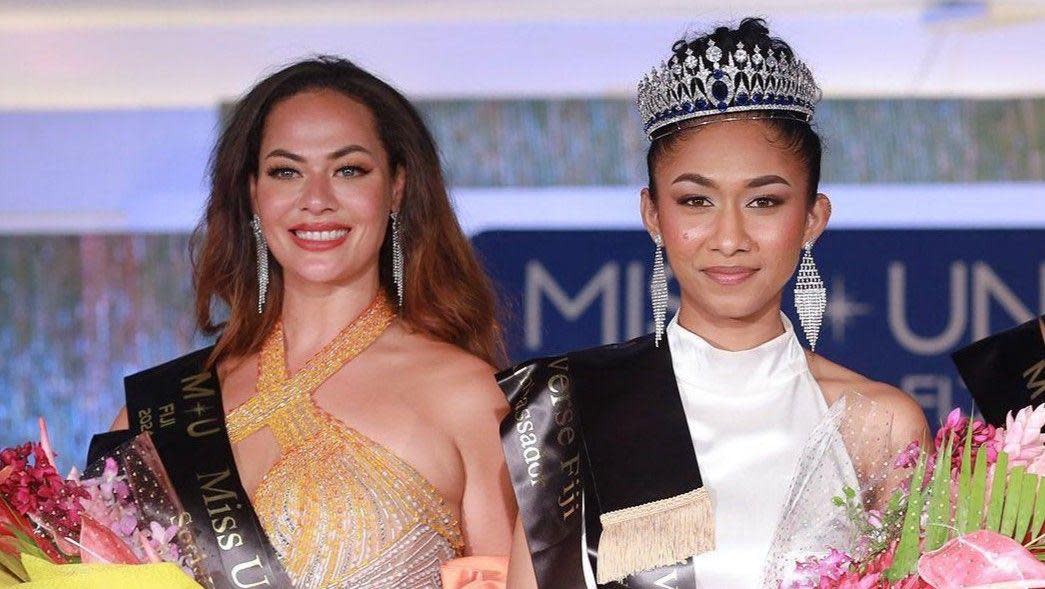A beauty pageant turns ugly: The alleged plot to steal a queen’s crown

Overlooking the clear waters of the South Pacific, a cyclone of controversy was about to descend on Fiji’s Pearl Resort & Spa.
Standing on stage clutching a bouquet of flowers, 24-year-old MBA student Manshika Prasad had just been crowned Miss Fiji.
But soon after, according to one of the judges, things at the beauty pageant “turned really ugly”.
Ugly is potentially an understatement: what unfolded over the next few days would see beauty queens crowned and unseated, wild allegations thrown around and eventually the emergence of a shadowy figure with a very personal connection to one of the contestants.
Ms Prasad first found out something was wrong two days after her win, when Miss Universe Fiji (MUF) issued a press release. It said a “serious breach of principles” had occurred, and “revised results” would be made public shortly.
A couple of hours later, Ms Prasad was told she wouldn’t be travelling to Mexico to compete for the Miss Universe title in November.
Instead, runner-up Nadine Roberts, a 30-year-old model and property developer from Sydney, whose mother is Fijian, would take her place.
The press release alleged the "correct procedures" had not been followed, and that Ms Prasad had been chosen in a rigged vote which favoured a “Fiji Indian” contestant to win because it would bring financial benefits to the event's manager.
A distraught Ms Prasad issued a statement saying she would be taking a break from social media, but warned that there was “so much the public did not know about”.
The new queen, meanwhile, offered a message of support. “We are all impacted by this,” Ms Roberts wrote on Instagram, before thanking Miss Universe Fiji for its “swift action”.
But those who took part in the contest were not satisfied: there were too many things that didn’t add up.

“Everything had been running so smoothly,” says Melissa White, one of seven judges on the panel.
A marine biologist by trade, she had been flown in from New Zealand to weigh in on the charity and environmental aspects of the contest.
“It was such a great night, such a successful show. So many people were saying they’d never seen pageant girls get along so well,” Ms White tells the BBC.
As the competition drew to a climax on Friday night, the judges were asked to write down the name of who they thought ought to be the next Miss Fiji.
“By this stage, Manshika [Prasad] was the clear winner,” says Jennifer Chan, another judge, who’s a US-based TV host and style and beauty expert.
“Not only based on what she presented on stage but also how she interacted with the other girls, how she photographed, how she modelled."
Ms Chan says she was “100% confident” that Ms Prasad was the strongest candidate to represent Fiji.
Enough of her fellow judges agreed and Ms Prasad was declared the winner - receiving four of the seven votes.
But as the newly-crowned Miss Universe Fiji stood on stage, beaming in her sparkling tiara, the judges sensed something was wrong.
To her right, Nadine Roberts - wearing her runners-up sash - was "seething", alleges Ms Chan.
“I remember going to bed thinking, how could someone feel so entitled to win?
“You win some, you lose some. She’s a seasoned beauty pageant contestant - surely she knew that?”
The next day, Ms Prasad took a celebratory boat trip with the judges.
“She was just in awe, saying: my life will be changed now,” says Ms Chan.
“She’s the embodiment of that good-hearted person who deserves it - it just affirmed to me that I’d picked the right girl."
But there had still been no official confirmation of Ms Prasad’s victory.
Not only this - one of the judges was conspicuously absent from the trip: Riri Febriani, who was representing Lux Projects, the company that bought the licence to hold Miss Universe in Fiji.
“I remember thinking that was odd,” says Ms White, who shared a room with Ms Febriani. “But she just said she had lots of work to do and she needed to talk to her boss.”
Ms Febriani says she didn’t go on the boat trip as she needed to rest - and there's no way the others would know who she was messaging on her phone.
But Ms White says she worked out her roommate was fielding calls and texts from a man called “Jamie”.

Miss Universe is a multi-million-dollar business which operates like a franchise - you need to buy a licence which enables you to use the brand and sell tickets for the event.
Those licences are expensive and in small countries it’s hard to find anyone willing to fund a national pageant - which is why Fiji hasn’t entered a contestant since 1981.
But this year, one organisation was willing to buy the licence: property development firm Lux Projects.
Ms Febriani was its representative on the judging panel, but also looked after media communications.
“I’d got on so well with her, she seemed a very sweet person,” says Ms White.
“But that day when she didn’t come on the boat, her demeanour kind of changed. She just kept saying she was super busy with work, always on the phone with this ‘Jamie’ guy."
It turned out that, despite having Ms Febriani on the panel, Lux Projects was not happy with the outcome of the vote.
Its press release on Sunday said the licensee itself should also get a vote - one which the contracted organiser, Grant Dwyer, had “failed to count”.
Lux Projects would have voted for Ms Roberts, bringing the results to a 4-4 tie.
What’s more, it said, the licensee also had the “determining vote” - making Ms Roberts the winner.
“Never at any point were we told about an eighth judge or any kind of absentee judge,” says Ms Chan.
“It wasn’t on the website, it wasn’t anywhere. Besides, how can you vote on a contest if you’re not even there?”
Ms White was also suspicious.
“I did some digging and it turns out that Lux Projects was closely associated with an Australian businessman called Jamie McIntyre,” says Ms White.
“And Jamie McIntyre,” she told the BBC, “is married to Nadine Roberts.”
The man on the phone
Mr McIntyre describes himself as an entrepreneur, investor and "world-leading educator", who has - according to information available online - been married to Ms Roberts since 2022.
He was also banned from doing business in Australia for a decade in 2016 due to his involvement in a property investment scheme that lost investors more than A$7m ($4.7m; £3.6m). The judge in the case said there was “no evidence to suggest that successful reform is likely”.
A senator who questioned him as part of a parliamentary committee hearing later described him as “the most evasive witness I have had to deal with - and that's saying something", according to the Sydney Morning Herald.
But what was he doing here?
“[Mr McIntyre] isn't a director or shareholder of the MUF licensee company, but has acted as an adviser, as he is a shareholder in associated companies,” Jamie McIntyre’s representatives told the BBC.
However, the company's Instagram page does feature a video of Mr McIntyre giving property investment advice, as well as a link to 21st Century University, a Bali-based property company owned by Mr McIntyre.
The BBC also understands that a "Jamie" was on the line during phone calls between Ms Roberts and the event organiser, Grant Dwyer.
Mr McIntyre’s representatives insist that allegations that he was involved in the judging controversy are a “conspiracy theory” - although they did concede that he had “provided advice to the licence holder”.
Additionally, the press release’s allegation that Mr Dwyer had pressured the panel to choose Ms Prasad because of her race is undermined by the fact that Mr Dwyer is understood to have voted for Ms Roberts.

“It’s just gross to even bring up race,” says Ms Chan. “It was never, ever once uttered amongst any of the judges,” she adds.
The BBC has sought comment from both Ms Roberts and Ms Prasad, but neither has responded.
Several of those involved - including some judges and contestants - have been sent “cease and desist” emails by Lux Projects, the BBC understands, which have been taken as tantamount to gagging orders by the recipients.
Prestige, glory - and money
This scandal in Fiji is by no means the first to hit the world of beauty pageants, which historically has seen its fair share of controversies.
“Pageants are full of drama, of controversies, of people saying the contest was a fix,” says Prof Hilary Levey Friedman, author of ‘Here She Is: The Complicated Reign of the Beauty Pageant in America.’
“But I will say that in more recent years, these issues have become much more pronounced thanks to social media,” she adds.
Apart from a voting scandal at the Miss America contest in 2022, recent controversies have tended to be in less developed parts of the world.
This is probably because they tend to be non-profit affairs in many Western countries, according to Prof Friedman, while pageants elsewhere have become more popular and more lucrative than ever.
“Historically, beauty pageants have been an amazing tool for social mobility for women,” says Prof Friedman.
“Apart from the prestige and the glory, it gives you a platform to attract followers and sponsorships. When there’s money involved, the stakes are higher.”
For Ms Prasad though, it turns out there is a happy ending.
On Friday, she posted on one of her social media accounts that she had indeed been re-crowned as Miss Fiji 2024.
“What an incredible journey this has been,” she wrote on Instagram.
Miss Universe Organization (MUO) has not responded to a request for comment, but the BBC understands it is extremely unhappy with the events in Fiji and, after having established the facts, worked hard to reinstate Ms Prasad as the island’s queen.
For Ms Prasad there is elation. For the judges, relief.
As for Ms Roberts, she is calling herself the “real Miss Universe Fiji 2024” on Instagram.
Judge Ms White says she’s “so proud of how Manshika [Prasad] has conducted herself throughout this journey. She’s a brilliant, compassionate, and beautiful young woman, who didn’t deserve this.
“We just wanted the truth to come out and now it has.”






